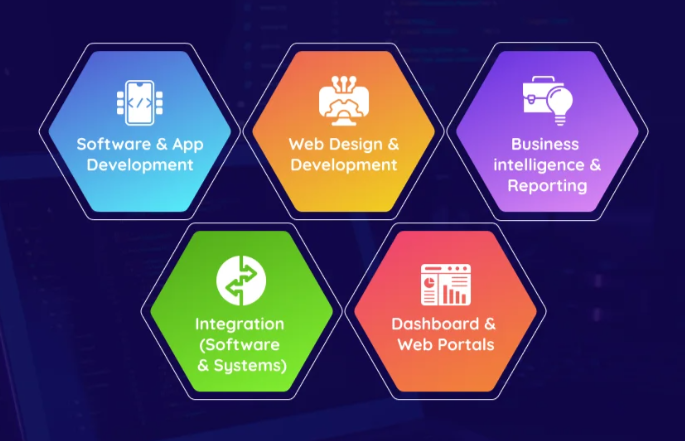In the fast-paced world of artificial intelligence, a handful of tech giants are vying for supremacy. OpenAI, Microsoft, Amazon AWS, Google, and Meta are at the forefront of this AI revolution, each bringing unique strengths to the table. As these industry leaders push the boundaries of what's possible, they're reshaping industries, transforming user experiences, and raising important ethical questions.
This blog post delves into the heart of the AI services landscape, examining how these tech titans are positioning themselves in this high-stakes race. We'll explore their core competencies, dissect their product offerings, and analyse their market share. From breakthrough language models to cutting-edge computer vision technologies, we'll uncover how each company is leveraging its expertise to gain a competitive edge.
Core Competencies
➡️ Strength: Cutting-edge language models (GPT series)
➡️ Weakness: Limited product diversity compared to tech giants
Microsoft
➡️ Strength: Integration of AI across a wide range of products (Azure, Office)
➡️ Weakness: Playing catch-up in some AI domains
➡️ Strength: Robust cloud infrastructure for AI deployment
➡️ Weakness: Less prominent in consumer-facing AI products
➡️ Strength: Diverse AI research and applications (DeepMind, Google Brain)
➡️ Weakness: Balancing AI innovation with core search business
➡️ Strength: AI in social media and virtual reality
➡️ Weakness: Public trust issues affecting AI adoption
Product Offerings
1. Language Models
➡️ OpenAI: GPT-3, GPT-4
➡️Google: BERT, LaMDA
➡️ Microsoft: Turing-NLG
➡️ Amazon: Amazon Lex
➡️ Meta: BlenderBot
2. Computer Vision
➡️Google: Cloud Vision AI
➡️ Amazon: Amazon Rekognition
➡️ Microsoft: Azure Computer Vision
➡️ Meta: PyTorch
➡️ OpenAI: DALL-E
3. Machine Learning Platforms
➡️ Google: TensorFlow, Cloud AI Platform
➡️Amazon: SageMaker
➡️ Microsoft: Azure Machine Learning
➡️ Meta: PyTorch
➡️ OpenAI: OpenAI Gym
Partnerships and Collaborations
➡️ Microsoft and OpenAI: Strategic partnership integrating OpenAI's models into Azure
➡️ Google and Mayo Clinic: Collaboration on AI in healthcare
➡️ Amazon and Novartis: AI-driven drug discovery and development
➡️ Meta and Ray-Ban: Smart glasses with AI capabilities
➡️ OpenAI and Shutterstock: AI-generated images for creative professionals
Ethical Considerations
1. Data Privacy: All companies are implementing stricter data handling practices.
2. Bias Mitigation: Efforts to reduce algorithmic bias in AI models.
3. Transparency: Increasing disclosure about AI use and limitations.
4. Job Displacement: Programs to retrain the workforce for an AI-driven economy.
5. Environmental Impact: Initiatives to reduce the carbon footprint of AI computations.
Market Share and Growth
As of 2024:
1. Microsoft: 25% (projected growth: 18%)
2. Amazon AWS: 22% (projected growth: 15%)
3. Google: 20% (projected growth: 17%)
4. Meta: 15% (projected growth: 12%)
5. OpenAI: 10% (projected growth: 25%)
Customer Case Studies
1. OpenAI: Notion using GPT-3 for enhanced note-taking and content generation.
2. Microsoft: Volkswagen leveraging Azure AI for autonomous driving research.
3. Amazon AWS: Lyft using SageMaker for ride demand prediction.
4. Google: Waymo's self-driving technology powered by Google's AI.
5. Meta: Spotify using Meta's AI for personalised music recommendations.
Future Trends
1. Multimodal AI: Integration of text, image, and voice in single models.
2. AI-Human Collaboration: More intuitive interfaces for AI-human interaction.
3. Edge AI: Increased processing on local devices for privacy and speed.
4. Quantum AI: Exploration of quantum computing for AI acceleration.
5. Explainable AI: Greater focus on interpretable AI models.
Conclusion
The AI race is intensifying, with each company leveraging its unique strengths to carve out a niche in this rapidly evolving landscape. While OpenAI leads in language models, Microsoft excels in integration, Amazon in cloud infrastructure, Google in research diversity, and Meta in social media AI applications.
As these tech giants push the boundaries of AI, the real winners are businesses and consumers who stand to benefit from these groundbreaking technologies. However, the ethical implications of AI development remain a critical consideration, requiring ongoing dialogue and responsible innovation.

Are you ready to harness the power of AI for your business? At C9, Australia's Leading Custom Software, Apps, Integration & Database Developer Company, we're at the forefront of AI integration. We can help you navigate the complex world of AI services, choosing the right solutions from industry leaders like OpenAI, Microsoft, Amazon AWS, Google, and Meta to drive your business forward.
Don't let the AI revolution pass you by. Contact C9 today for a consultation on how we can leverage cutting-edge AI technologies to transform your operations, enhance customer experiences, and give you a competitive edge in the digital age.
Visit our website or call us at https://c9.com.au/ to start your AI journey with C9. Let's shape the future of your business together!
Reference:
Market Share and Growth
1. Gartner. (2023). "Gartner Forecasts Worldwide Public Cloud End-User Spending to Reach Nearly $600 Billion in 2023."
https://www.gartner.com/en/newsroom/press-releases/2022-10-31-gartner-forecasts-worldwide-public-cloud-end-user-spending-to-reach-nearly-600-billion-in-2023
2. IDC. (2023). "Worldwide Artificial Intelligence Spending Guide."
https://www.idc.com/getdoc.jsp?containerId=IDC_P33198
Core Competencies and Product Offerings
3. OpenAI. (2023). "OpenAI API."
https://openai.com/api/
4. Microsoft. (2023). "Azure AI."
https://azure.microsoft.com/en-us/solutions/ai/
5. Amazon Web Services. (2023). "AWS AI Services."
https://aws.amazon.com/machine-learning/ai-services/
6. Google Cloud. (2023). "Artificial Intelligence."
https://cloud.google.com/products/ai
7. Meta AI. (2023). "Research."
https://ai.facebook.com/research/
Partnerships and Collaborations
8. Microsoft News Center. (2023). "Microsoft and OpenAI extend partnership."
https://news.microsoft.com/2023/01/23/microsoft-and-openai-extend-partnership/
9. Google Cloud. (2021). "Google Cloud and Mayo Clinic expand partnership."
https://cloud.google.com/blog/topics/healthcare-life-sciences/google-cloud-and-mayo-clinic-expand-partnership
10. Amazon Web Services. (2019). "Novartis and AWS collaborate to accelerate digital transformation."
https://press.aboutamazon.com/news-releases/news-release-details/novartis-and-aws-collaborate-accelerate-digital-transformation
Ethical Considerations
11. MIT Technology Review. (2023). "The AI Ethics Mess."
https://www.technologyreview.com/2023/04/06/1071590/the-ai-ethics-mess/
12. World Economic Forum. (2023). "Artificial Intelligence Ethics & Governance."
https://www.weforum.org/communities/artificial-intelligence-ethics-governance
Future Trends
13. McKinsey & Company. (2023). "The State of AI in 2023: Generative AI's breakout year."
https://www.mckinsey.com/capabilities/quantumblack/our-insights/the-state-of-ai-in-2023-generative-ais-breakout-year
14. Deloitte Insights. (2023). "Tech Trends 2023."
https://www2.deloitte.com/us/en/insights/focus/tech-trends.html